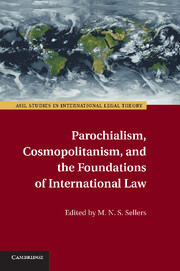Book contents
- Frontmatter
- Contents
- Notes on Contributors
- Preface
- 1 Introduction
- 2 Parochialism and the Legitimacy of International Law
- 3 Parochialism, Cosmopolitanism, and the Paradigms of International Law
- 4 Liberal Cosmopolitanism or Cosmopolitan Liberalism?
- 5 Are Human Rights Parochial?
- 6 The Parochial Foundations of Cosmopolitan Rights
- 7 Rights in Reverse
- 8 Parochial Restraints on Religious Liberty
- 9 Parochialism, Cosmopolitanism, and Justice
- Index
- References
9 - Parochialism, Cosmopolitanism, and Justice
Published online by Cambridge University Press: 05 December 2011
- Frontmatter
- Contents
- Notes on Contributors
- Preface
- 1 Introduction
- 2 Parochialism and the Legitimacy of International Law
- 3 Parochialism, Cosmopolitanism, and the Paradigms of International Law
- 4 Liberal Cosmopolitanism or Cosmopolitan Liberalism?
- 5 Are Human Rights Parochial?
- 6 The Parochial Foundations of Cosmopolitan Rights
- 7 Rights in Reverse
- 8 Parochial Restraints on Religious Liberty
- 9 Parochialism, Cosmopolitanism, and Justice
- Index
- References
Summary
Any careful consideration of the international legal order will reach the same conclusion as every author in this volume, which is that parochialism and cosmopolitanism stand together at the center of the theoretical and historical foundations of international law. The first problem in global justice is where to draw the boundary between the two. The modern law of nations as developed by Grotius, Vattel, and Wheaton began with “those rules of conduct which reason deduces, as consonant to justice and common good, from the nature of the society existing among independent nations.” This doctrine assumes both a cosmopolitan standard (“reason”) and parochial communities (“nations”). The difficulty lies in distinguishing the proper borders between the jurisdiction of international law, national law, individual autonomy, and other parochial communities of specialized legal order. Justice and the common good determine what is cosmopolitan, what should be parochial, and where to draw the legal boundaries of blood, soil, power, and authority.
Hugo Grotius stated the problem very well when he refuted Carneades’ primitive realism at the beginning of his discussion of the laws of war and peace. Law arises from the desire to maintain social harmony, and each person and every social group has its own role to play in doing so. We owe a duty of care and obedience to our fellow citizens, but also to our fellow human beings. The trick is to avoid confusing the law of nations with what is the law only of certain peoples and vice versa. Grotius understood that international law governs matters of international concern. Other questions belong to states, or to the people themselves. Tradition excluded rules governing (for example) the acquisition of property from international law, or the seizure of goods for debt, or the decision of nations whether to trade (or not) with others.
- Type
- Chapter
- Information
- Publisher: Cambridge University PressPrint publication year: 2011
References
- 1
- Cited by



